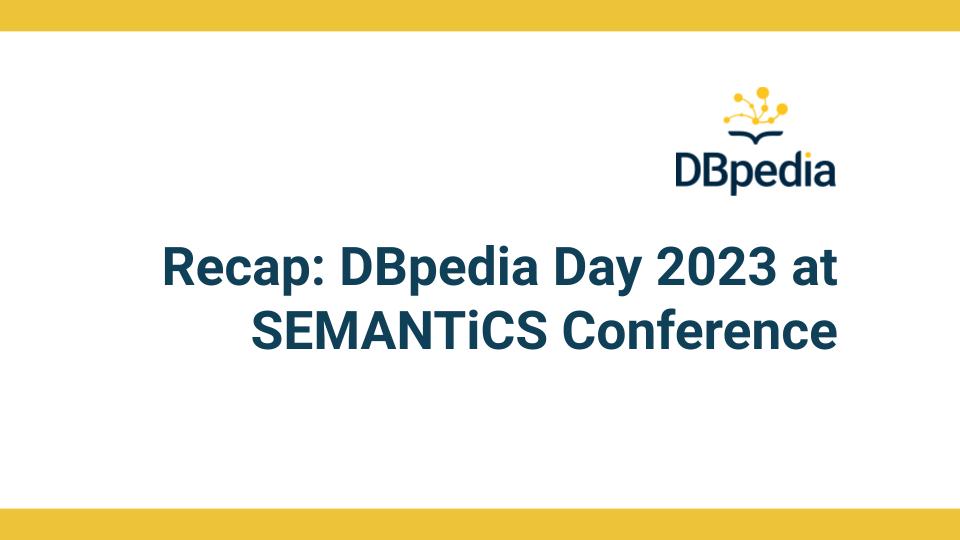Wow! Up to 120 DBpedians joined the DBpedia Day on September 20, 2023, in Leipzig, Germany. This year’s meeting was again co-located with the SEMANTiCS conference.
First and foremost, we would like to thank the Institute for Applied Informatics for supporting our community and many thanks to the SEMANTiCS organization team for hosting this year’s community meeting.
Opening of the DBpedia Day
Also this year, our CEO Sebastian Hellmann opened the community meeting by presenting the Databus 2.1.0 project (slides). Afterwards, Edward Curry from the University of Galway gave his fantastic keynote presentation “Towards Foundation Models for Data Spaces”. You can read his abstract here.
Member Presentation Session
Milan Dojchinovski, InfAI/DBpedia Association and CTU Prague, started the member presentation session with a short welcome. The first speaker was Angel Moreno, GNOSS, with his presentation “NEURALIA Rioja: the unified Knowledge Graph of La Rioja Government which integrates twenty six sources of information in a single access point” (slides). Shortly after, Enno Meijers, KB, talked about “Network-of-Terms, bringing links to your data” (slides). Next, Sarah Binta Alam Shoilee, Network Institute & Vrije Universiteit Amsterdam talked about ”Cultural AI Lab”(slides). This was followed by the presentation “Linking and Consumption of DBpedia in TriplyDB” by Kathrin Dentler & Wouter Beek, TriplyDB (slides). Then Sebastian Gabler, SWC, talked about “Using Dewey Decimal Classification for linked data” (slides). Finally, the last talk of this session was given by Sebastian Tramp, eccenca, with “Using DBpedia Services with eccenca Corporate Memory and eccenca.my”.
For further details of the presentations follow the links to the slides.
- “NEURALIA Rioja: the unified Knowledge Graph of La Rioja Government which integrates twenty six sources of information in a single access point” by Angel Moreno, GNOSS (slides)
- “Network-of-Terms, bringing links to your data” by Enno Meijers, KB (slides)
- ”Cultural AI Lab” by Sarah Binta Alam Shoilee, Network Institute & Vrije Universiteit Amsterdam (slides)
- “Linking and Consumption of DBpedia in TriplyDB” by Kathrin Dentler & Wouter Beek, TriplyDB (slides)
- “Using Dewey Decimal Classification for linked data” by Sebastian Gabler, SWC (slides)
- “Using DBpedia Services with eccenca Corporate Memory and eccenca.my” by Sebastian Tramp, eccenca (slides)
DBpedia Science: Linking and Consumption
This session was dedicated to the most recent research on linking and consumption of the DBpedia Knowledge Graph and beyond. Novel methods, tools and challenges around linking and consumption of knowledge graphs were presented and discussed. Milan Dojchinovski, InfAI/DBpedia Association and CTU Prague, chaired this session with five talks. Hereafter you will find the presentations given during this session:
- “Open Research Knowledge Graph” by Sören Auer, TIB
- “Blocking Methods for Entity Resolution on Knowledge Graphs” by Daniel Obraczka, Data Science Center ScaDS.AI Dresden/Leipzig (slides)
- “Validating SHACL Constraints with Reasoning: Lessons Learned from DBpedia” by Maribel Acosta, TUM School of Computation, Information and Technology
- “Exploiting Semi-Structured Information in Wikipedia for Knowledge Graph Construction” by Nicolas Heist, Data and Web Science Group, University of Mannheim (slides)
- “Using Pre-trained Language Models for Abstractive DBpedia Summarization” by Hamada Zahera, Data Science Group, Paderborn University (slides)
DBpedia Community session
Sebastian Hellmann, InfAI/DBpedia Association, hosted this year’s community session. DBpedia has had a major impact on data landscape during our 15-year journey. This session discussed the progress of the vision of a “Global and Unified Access to Knowledge Graphs”, which paved the way for an international FAIR Open Data Space driven by knowledge graphs. The session focused on the potential of large-scale knowledge graphs to reshape the open data domain. Topics included how the DBpedia community can pool its data, tools and know-how more effectively, and how we can make these assets more findable, accessible and interoperable. The session provided an insightful discourse on the future of open data and how we can forge strategic alliances across diverse industrial sectors.
Following, you find the presentations of this session:
- “Update Japanese DBpedia” Hideaki Takeda, LODI (slides)
- Several impulses about different topics and follow-up discussion, moderated by Sebastian Hellmann, InfAI/DBpedia Association (discussion document)
In case you missed the event, all slides are also available on our event page. Further insights, feedback and photos about the event are available on Twitter via #DBpediaDay.
We are now looking forward to more DBpedia events in the upcoming months and at next year’s SEMANTiCS Conference, which will be held in Amsterdam, Netherlands.
Stay safe and check Twitter or LinkedIn. Furthermore, you can subscribe to our Newsletter for the latest news and information around DBpedia.
Maria & Julia
on behalf of the DBpedia Association
- Did you consider this information as helpful?
- Yep!Not quite ...

